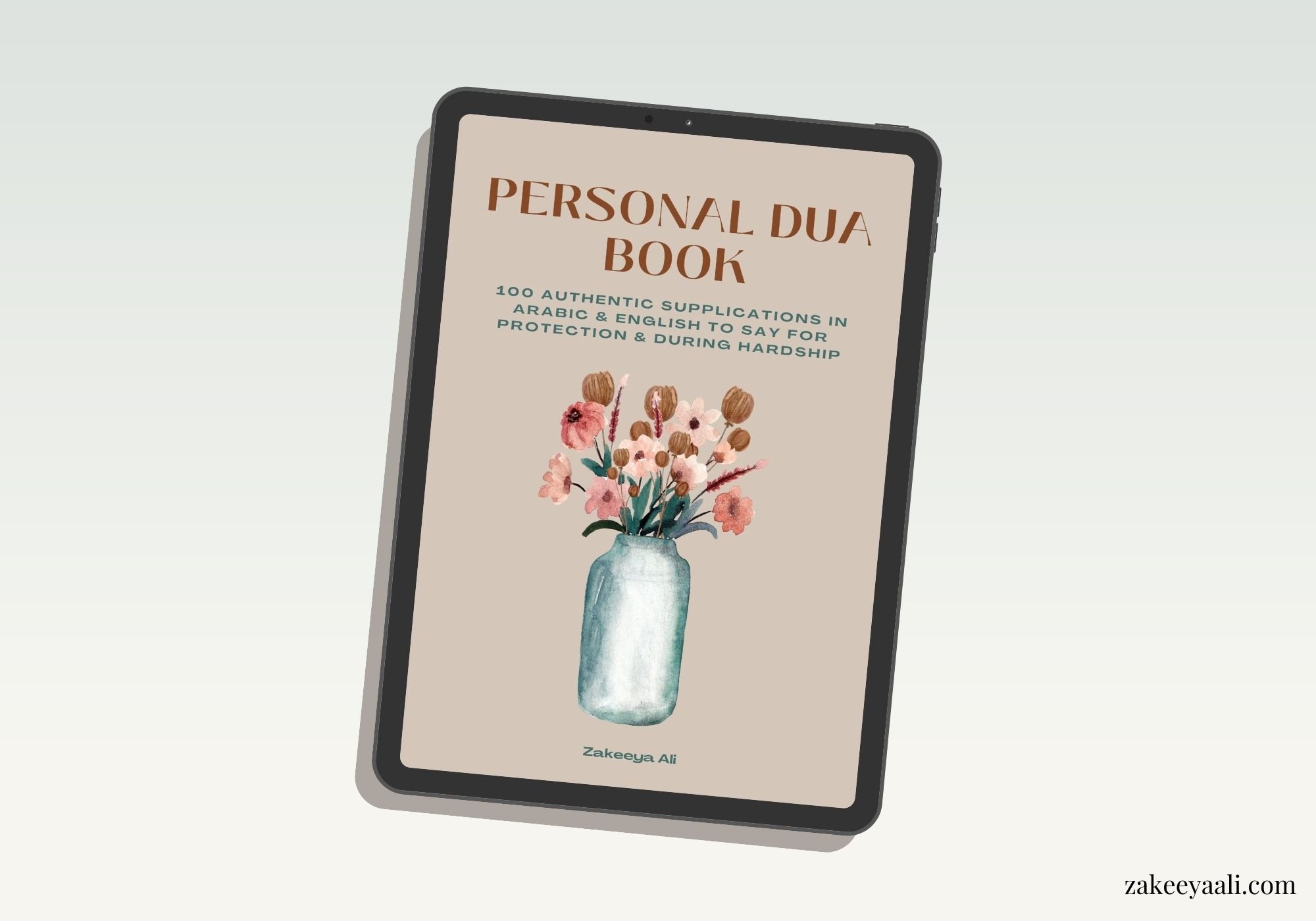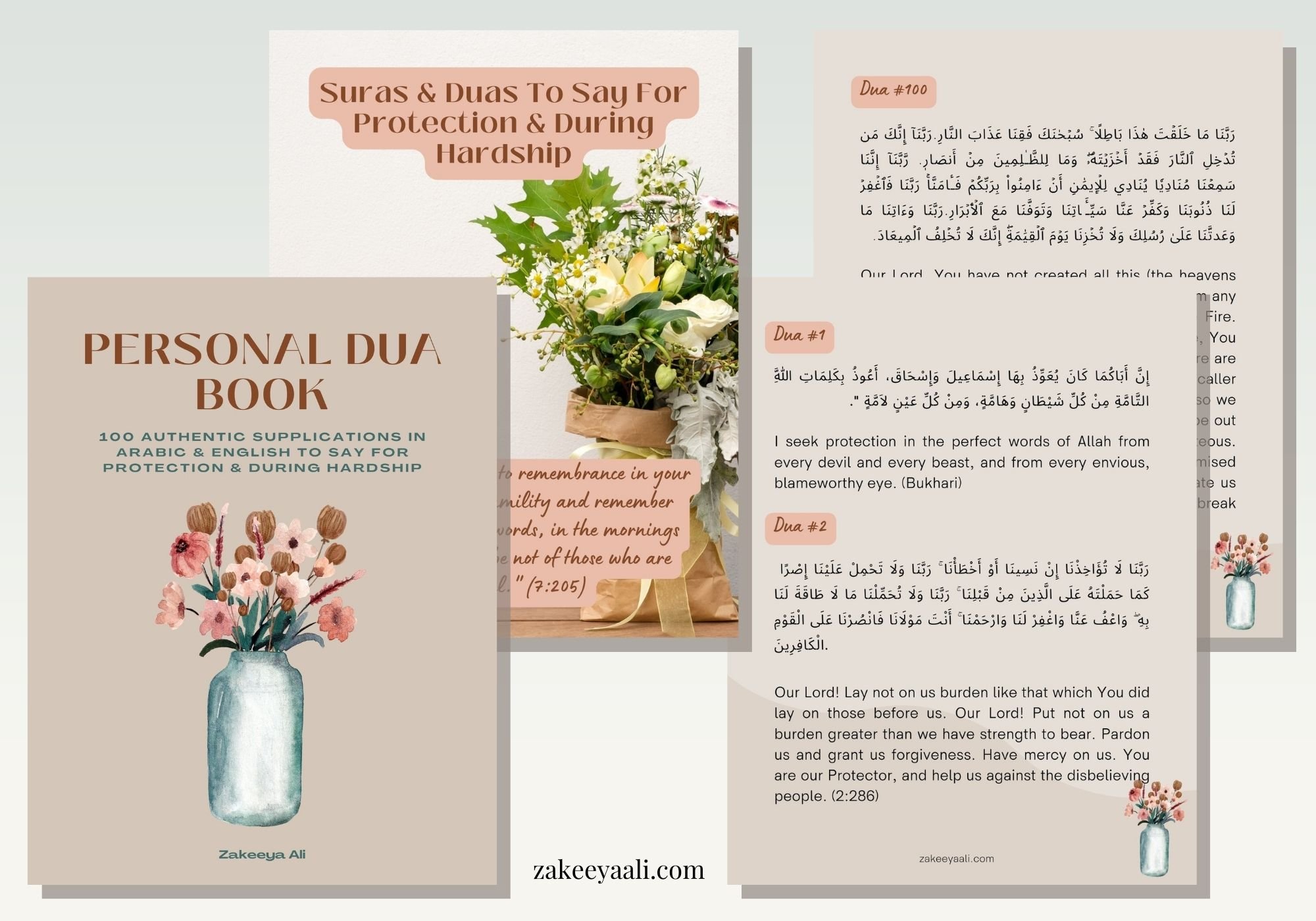Setting Meaningful Goals as a Muslim Woman
Subhanallah, can you believe it’s already the start of a new Gregorian year? Time truly flies. Some years seem more hectic than others, and we often experience significant life events that shape us. Last year was particularly momentous for me as my first child got married. Alhamdulillah, it was a beautiful journey and a wonderful learning experience. If you’re curious about the lessons I learned as a mother during this time, you can check out this article I wrote.
As I write this, Ramadan is just a little over two months away. Reflecting on last Ramadan, subhanallah, it feels as vivid as yesterday. Around this time of year—be it the start of the Islamic or Gregorian calendar—or after Ramadan in the first week of Shawwal, I like to take a moment to reset and realign my objectives.
My process begins with creating a comprehensive list of realistic goals I want to achieve in the coming year. This list is usually a mix of refreshed goals from the previous year, things I want to let go of, and aspirations I want to renew. In many ways, it’s an ongoing, evolving list, which I find much more effective than crafting an entirely new one each year that ends up being overwhelming or unattainable.
In this piece, I’ll share some ideas to inspire your own goal-setting process, especially if you’re unsure where to start. Remember, not everything on the list may resonate with you, and that’s okay. You don’t need to adopt every goal. Instead, use it as a reference, pick what speaks to you, and focus on taking small, meaningful steps toward a few goals. Progress, no matter how gradual, is far more sustainable than striving for perfection all at once.
Some Ideas of Meaningful Goals to Set at the Right Time
1. Spiritual Well-Being
Assign times for your daily prayers so you don’t miss or delay your fards.
Add in some sunnah or nafl prayers to your week to gain extra barakah.
Engage in regular recitation of the Quran or listen to the recitation to deepen your connection with our holy book.
If you’re not an Arabic speaker, read daily the Quran in your preferred language; even if it’s just a verse or two, or three. I like to journal my Quran verses for deeper absorption.
Read some tafseer of the Quran or listen to some explaination of surahs on YouTube, especially about the verses you don’t understand. I also love to write the pointers from tafseer in my Quran Journal.
Learn some Quranic Arabic if you would like to eventually understand the Quran as it was revealed by Allah SWT without turning to the translation written by people. I have studied from YouTubers like these.
Set a plan to attend some local Islamic events or lectures to get interactive knowledge about the deen, as well as get some social time. If you prefer being a homebody like me, you can join a live virtual halaqa or even listen to some recordings if you have limited time. I like to join halaqas by Dr. Aysha Wazwaz as she is not a “feminist shaykha” who cause women to fear men and poverty, or shames us for being good wives, moms, and homemakers (please watch out for those popular shaykhas online).
Read a Hadith or two a few times per week to expand your knowledge of the deen and learn about the Prophet’s SAW mannerisms and etiquette (this is priceless knowledge). I like to start with the 40 Hadith of Imam an Nawawi in this version.
Begin the habit of reading your morning and/or evening adkhar duas. This has been life-changing for me especially when scholars mention you can read the duas in your preferred language and I found this amazing app with all the duas available on my phone. You can also purchase my handy Arabic and English dua book with or English-only version dua book if you prefer reading a compilation of my fave duas.
2. Physical Well-being
Establish a balanced and nutritious meal plan for yourself but keep it simple and work on improving one health aspect at a time. When I started my journey I learned first about incorporating Prophetic foods in my diet and about the foods that cause inflammation in my body, because this will lead you on a journey of enlightenment, make you respect your body, and be more inclined to eat well.
Incorporate regular exercise into your routine, even if it's just taking a short walk or hike, lifting light weights at home or doing some pilates, or simply rebounding on a mini trampoline which is one of my favorite ways to stay fit.
Prioritize sufficient sleep to ensure both mental and physical vitality by setting yourself a bedtime and sticking to it as much as possible. Making a schedule for yourself really helps to keep to this habit. Go early to bed and get up early to follow the sunnah and notice your days have way more barakah.
Develop good skin, hair, teeth, and nail habits to take better care of your body and enhance your features to help improve your confidence and well-being. I like to make my own homemade products, which consist of natural ingredients and simple steps. You can find my ideas for natural living here.
Ensure you are getting enough sunshine and fresh air because many people today are deficient on vitamin D which can cause a person to develop many negative symptoms from being indoors too much and going out with sunscreen which cause your body to not absorb enough of the sun’s rays. You can learn more about vitamin deficiency issues by Dr. Berg in this video.
3. Mental & Emotional Well-Being
Cultivate a positive mindset by focusing on your blessings instead of your challenges all the time. What I suggest is to write down three things you are grateful for in your life daily, then make shukr to Allah SWT for giving you all those blessings and ask Him for more.
Learn stress-management techniques such as deep breathing techniques, taking time out to think, or being more mindful about the choices you make, like what you purchase and where and with whom you spend your precious time with.
Foster emotional connections by spending quality time with your loved ones and those you learn from and by detaching from the people who bring you turmoil, stress, and anxiety.
Schedule regular breaks from your electronic devices to reduce screen time, eye strain, and time drain, and establish tech-free moments in your home (like during mealtimes) to promote face-to-face interactions and meaningful discussions with your family.
Use technology mindfully, avoiding excessive exposure to stress-inducing content and find ways to support the ummah without numbingly scrolling through traumatic videos and photos, or ranting on comments. Repost relevant and helpful content and ensure you balance it with positive and faith-filled advice, or go cold turkey and get off social media for good since it brings more pain than joy.
Learn to say no to people when necessary, prioritize your well-being as a woman to avoid burnout, focus on solutions rather than problems, and practice positive self-talk and affirmations to boost your self-esteem instead of turning to others to sooth your tension.
Spend time outdoors, appreciating the beauty of nature and its calming effects, create a small garden at home or nurture some plants indoor which will help bring you serenity.
Incorporate nature walks or outdoor activities into your routine for a refreshing break, and invest time in activities that bring you joy and contribute to your overall happiness.
Set academic or professional goals that align with your interests and skills, but ensure it does not conflict with your nurturing duties to your family. Rather wait till the time is right to pursue hectic goals as it will be less stressful in the long-run and you will have plenty of time inshallah when your kids are older to pursue these goals.
Encourage a culture of learning within your family, fostering curiosity and a love of Islam and the Prophet SAW. Sit with your family and have wholesome discussions often, start a weekly or bi-weekly halaqa time with your kids, or have an Islamic quiz night and hand out prizes.
Regularly assess your goals and progress and seek constructive feedback from trusted people offline and online to facilitate personal growth and recognize that self-improvement is an ongoing process.
Create a realistic daily schedule for yourself and your home that balances work, family, and personal time and delegate tasks within your family to share responsibilities so everything is not on your head.
Acknowledge that life comes with unexpected challenges, so be flexible and adaptable, seek support from family, friends, or a mentor when needed, and practice self-compassion, understanding that attaining perfection is not the goal of life.
Volunteer your time and skills to local charities or community projects within your capabilities as this makes your realize your blessings and appreciate all you have, as well as serve others to keep your nafs humble.
Instill the value of charity in your children by involving them in philanthropic activities or teach them how to serve their parents, grandparents, and siblings as this will avoid them growing up into selfish and self-absorbed adults.
Contribute to initiatives that uplift and support other Muslim women. Some examples include helping singles to get married, assisting mothers so they can get time for themselves, and aiding wives to strengthen their marriage bonds.
17. Family, Home, and Life Well-Being
Strengthen the bond with your husband through better communication tactics and spending quality time together instead of just focusing on your responsibilities which are never-ending.
Nurture a supportive and loving environment for your children and spend constructive time with them one-to-one. Foster independence in your children by encouraging responsibility and decision-making.
Establish family traditions that promote unity and create lasting memories, and encourage a culture of respect and understanding within the family as a priority, even above academic pursuits.
Develop a well-organized system for household chores and responsibilities. For example you can create a cleaning schedule to maintain a tidy and comfortable living space, implement practical storage solutions to keep the home clutter-free, plan nutritious and varied meals for your family, and master time-saving techniques to keep things interesting but not stressful.
Establish a household budget to manage expenses effectively and avoid wastefulness and extravagance. Prioritize saving and investments to secure your family's financial future to help your husband with the burdens if you have time. You can also educate your children about financial responsibility and haraam finances which will help them for their future.
Create a welcoming home atmosphere by decorating your home in a way that reflects your family's personality and values, incorporate elements of comfort, such as cozy furnishings and personalized touches. I cannot emphasize enough how nice this feels for your loved ones.
Implement family rituals, like cooking challenges, game nights, and lifeskill discussions to enhance family bonding. A cooking challenge is where members of the family make dishes to compare and be judged on their cooking skills. Game nights can include playing Islamic quizzes, trivia, board games, or party video games together. The lifeskill discussion is where each member of the family shares something they learned or accomplished in a group discussion to aid others in self-improvement, this can include Islamic aspects as well to turn it into a halaqa.
Initiate and maintain good connections with your neighbors and community members and make it a habit to visit the masjid and be part of the ummah. I see many families cut connections with their neighbors or the Muslim community because they do not like how they behave. However the best way to make positive changes is to be a good example and to never give up hope, this is how a good Muslim behaves and our children need to see us being good to others no matter what.
By no means was this list exhaustive, but it was some ideas of the meanful goals that I have been working on for years for myself and with my family. I pray some of these suggestions will help you and your family become closer and work towards becoming the best you can be. May Allah SWT guide and protect the ummah, ameen.
Find Support as a Muslim Woman
Stop struggling in your life, with your faith, family, friends or relationship. You don’t need to suffer in silence or figure it all out alone. Find empathetic and discrete support to help you navigate through your challenges with an experienced professional. Book a one-on-one mentoring session with Zakeeya to receive tailored advice to address your concerns whether big or small.
Salam, I’m Zakeeya!
I believe that making our homes a safe haven for our families, as well as being a wife and mother, brings us great blessings, contentment, and benefits to society as a whole. Since 2011, I've been dedicated to assisting Muslimas in finding tranquility in their roles, taking better care of themselves, and achieving inner peace. Our journey in this world is not an easy one, but I pray the tools and guidance I offer will help you face life's challenges with more gratitude and mindfulness. Join me as I share wifehood, motherhood, homemaking, and lifestyle solutions that make life more fulfilling for you as a woman! Read more about me here.
Instill Your Daily Dose of Dua
Order my handy dua ebooks, which are available in an Arabic/English or English only version, and contain 100 authentic duas to say for protection and during hardship.

























